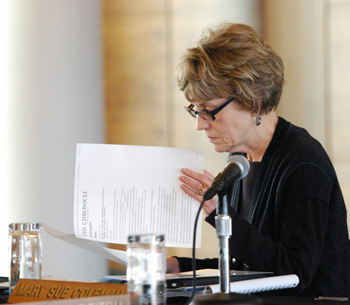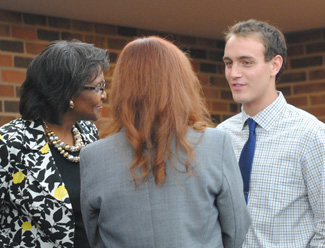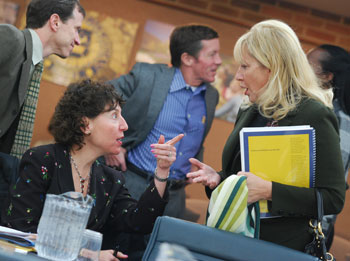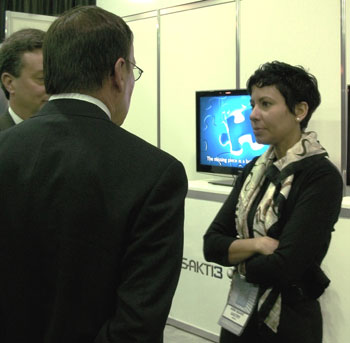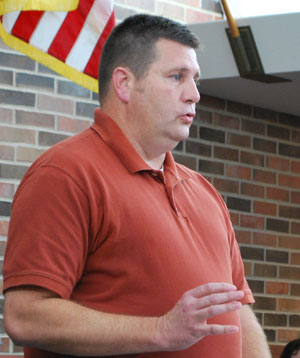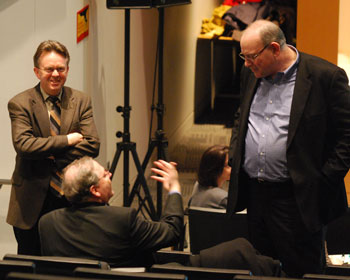University of Michigan board of regents meeting (May 19, 2011): This month’s regents meeting, held at the Dearborn campus, began with rare public discord between a majority of board members and UM president Mary Sue Coleman – and an even rarer public debate between regents.
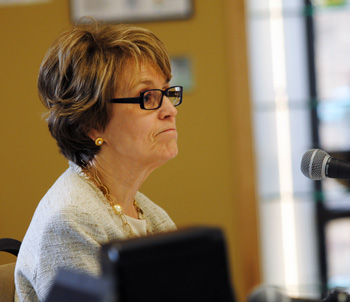
University of Michigan president Mary Sue Coleman before the start of the May 19, 2011 regents meeting, which was held at the Fairlane Center on UM's Dearborn campus. (Photos by the writer.)
The issue was a resolution introduced at the start of Thursday’s meeting – an item not originally on the agenda – to support the rights of graduate student research assistants to decide whether to organize and be represented by a labor union. Before the vote, Coleman spoke out against the move, describing the relationship between graduate researchers and faculty as a special one that was fundamentally different than an employee-employer relationship. Changing the nature of that interaction could affect the university in significant ways, which she said caused her deep concern. The board’s two Republican regents – Andrew Richner and Andrea Fischer Newman – also objected to the resolution, both criticizing the fact that it had been introduced at the last minute without time for adequate discussion.
The resolution passed on a 6-2 vote, with Richner and Newman dissenting. It was notable in part because, with the exception of votes regarding tuition increases, nearly all votes by the board are unanimous, and in accord with the administration’s recommendations.
The meeting also included a variety of other action items, but none that spurred commentary by regents. They voted to increase room and board rates for 2011-12 by 3%, approved the schematic design for a $52 million expansion of Crisler Arena, and authorized the tenure or promotion of 169 faculty members on the Ann Arbor campus.
Regents also authorized creation of the Institute for Health Care Policy & Innovation, a new venture to be housed at renovated space in the North Campus Research Complex (NCRC) – a $13.7 million renovation project that regents also authorized at the meeting. Ora Hirsch Pescovitz, executive vice president for medical affairs, said the institute will be the largest co-located group of health care researchers anywhere in the world.
In other action related to the NCRC, regents approved agreements – among a collection of 17 conflict-of-interest disclosures – with six start-ups that will lease space in the former Pfizer site, as part of the university’s Venture Accelerator program.
And in another item added to the agenda during the meeting, regents voted to approve the hiring of Lisa Rudgers as UM’s new vice president for global communications and strategic initiatives, effective June 1 with a salary of $270,000.
The board also got an update from Sue Scarnecchia, UM’s vice president and general counsel, on the Compliance Resource Center – a new website that coordinates various compliance efforts at the university.
At the end of the meeting, philosophy professor Carl Cohen spoke during public commentary, passionately urging regents to intercede in the renovation of East Quad in order to prevent the Residential College from being pushed into smaller, inadequate space. The RC is a living-learning program that Cohen helped start in the 1960s, and that’s housed at East Quad. If regents did nothing, he said, “your Residential College will atrophy and fade away.” [Full Story]




